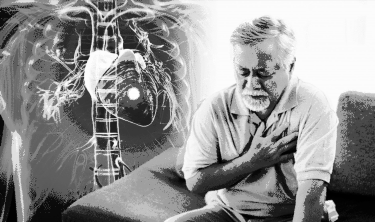Heart attack warning: Research reveals a ‘surprising’ risk factor

Heart attack happens when there is a sudden loss of blood flow to a part of a person’s heart muscle.
The condition requires a swift response to avert the risk of a potentially fatal escalation.
Quick treatment is crucial to restore blood flow to blocked arteries and save lives.
Despite the high stakes, recent research reveals that the time it takes for patients to interpret and respond to symptoms is the main reason for delays in getting to a hospital and the care they need, according to research published in the European Journal of Cardiovascular Nursing.
The study enrolled 326 patients undergoing acute treatment for a first or second heart attack.
Participants completed the validated questionnaire “Patients’ appraisal, emotions and action tendencies preceding care-seeking in acute myocardial infarction” (PA-AMI).
Patients in the study waited a median of three hours before seeking medical help.
Some delayed for more than 24 hours.
What slowed down their reaction? This study identified two general reactions.
It is possibly linked to fear or anxiety
Dr Carolin Nymark, study author
A perceived inability to act had a significant impact on patients who waited more than 12 hours.
These patients said: “I lost all power to act when my symptoms began”; “I did not know what to do when I got my symptoms”; “My symptoms paralysed me”; and “I felt I had lost control of myself when I got my symptoms.”
“This immobilisation during ongoing heart attack symptoms has not been shown or studied before,” said study author Dr Carolin Nymark, of Karolinska University Hospital, Stockholm, Sweden.
He added: “At the moment we don’t know why some patients react in this way. It is possibly linked to fear or anxiety. This should be a novel element in educating people about what to do when they have heart attack symptoms.”
Inaccurate symptom appraisal also affected those who delayed for more than twelve hours.
These patients said it took a long time to understand their symptoms; they thought the symptoms would pass; they thought the symptoms were not serious enough to seek medical care; and they thought it would be difficult to seek medical care.
Conversely, patients who accurately identified their heart attack symptoms and sought medical help quickly had a wish to seek care, knew the symptoms were serious and where they should go to get help, and did not try to divert their thoughts away from the symptoms.
“Our previous research has shown that some patients believe their symptoms aren’t serious enough to call an ambulance,” said Dr Nymark.
He added: “Others think the intensive care unit is closed in the middle of the night, perhaps because they do not think clearly during the event.”
According to the NHS, an overwhelming sense of anxiety (similar to having a panic attack) is a warning sign of a heart attack.
“Another red flag is feeling you have no power to act on your symptoms,” said Dr Nymark.
“This may indicate a real health threat and the need to call an ambulance,” he warned.
Dr Nymark said this new signal could be discussed in outpatient appointments for those with cardiovascular risk factors and in cardiac rehabilitation programmes for heart attack survivors. The study questionnaire could be used to identify patients who previously experienced an inability to act or poor symptom appraisal.
“Our findings are worrying because even a small reduction in delay would save heart muscle and lives,” said Dr Nymark.
“Reducing patient delays appears to be a complex task and we need to find innovative ways to inform and educate patients and the public,” he explained.
In his concluding remarks, Dr Nymark urged: “If you have symptoms that may be caused by a heart attack, don’t ignore them. Call for help immediately. It is better to be wrong about the symptoms than dead.”
Source: Read Full Article


